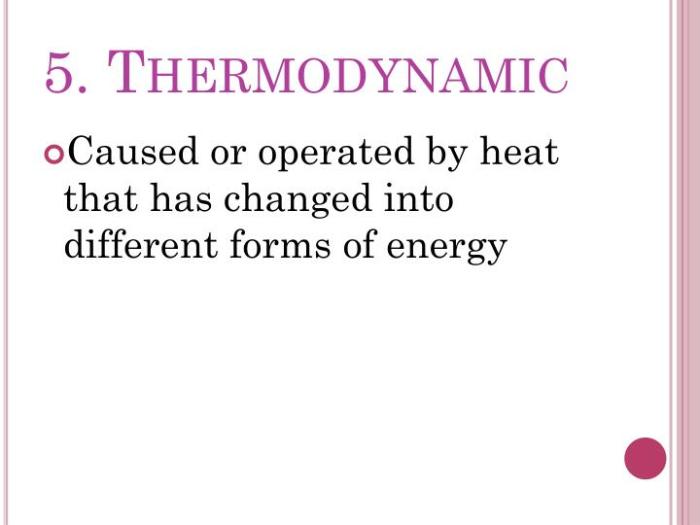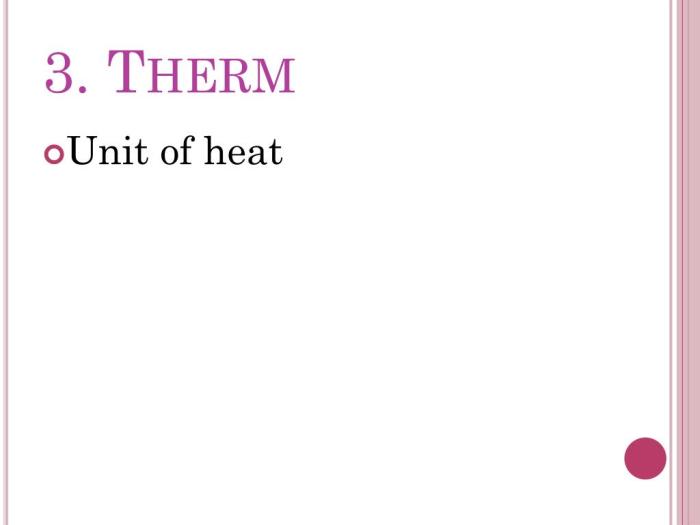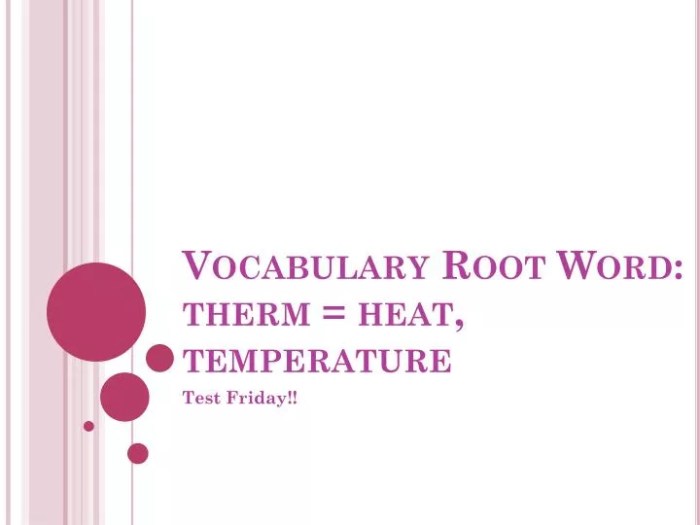Words that begin with therm – Delving into the realm of words that begin with “therm,” we embark on a journey that unravels the intricate tapestry of etymology, science, and culture. These words, like thermionic, thermometer, and thermogenesis, hold a fascinating history, shape our scientific understanding, and permeate our everyday language.
Their origins trace back to the Greek word “thermos,” meaning “heat,” providing a glimpse into the deep-rooted significance of temperature in human knowledge and experience.
Etymology and Origins

Words that begin with “therm” share a common root in the Greek word “thermos,” meaning “hot.” This root has been used in scientific and technical contexts for centuries to describe concepts related to heat and temperature.
The linguistic evolution of these words has been influenced by various factors, including the development of scientific theories and the invention of new technologies. For instance, the term “thermometer” was coined in the 17th century to describe a device for measuring temperature, while the term “thermodynamics” emerged in the 19th century to describe the study of heat and its relation to other forms of energy.
Use in Different Fields
Words that begin with “therm” are used across various fields, including physics, chemistry, and engineering. In physics, they are used to describe concepts such as temperature, heat, and thermal energy. In chemistry, they are used to describe thermodynamic properties of substances, such as enthalpy and entropy.
In engineering, they are used to design and optimize systems that involve heat transfer and temperature control.
Scientific Applications
Words beginning with “therm” hold significant importance in scientific contexts, denoting concepts related to heat, temperature, and thermodynamics.
These terms are extensively employed in various scientific disciplines, including physics, chemistry, and biology. Let’s delve into some key examples and their applications:
Physics
In physics, “therm” words are used to describe thermal properties and processes:
- Thermodynamics: The study of energy transfer and transformations, including heat and work.
- Thermometry: The measurement of temperature using thermometers.
- Thermal conductivity: The ability of a material to transfer heat.
Chemistry
In chemistry, “therm” words are used to describe reactions and processes involving heat:
- Thermochemistry: The study of heat changes in chemical reactions.
- Thermogravimetric analysis (TGA): A technique used to determine the mass change of a material as a function of temperature.
- Thermoplastic: A type of plastic that can be repeatedly softened by heating and hardened by cooling.
Biology
In biology, “therm” words are used to describe temperature-related adaptations and processes:
- Thermophile: An organism that thrives in high-temperature environments.
- Thermoregulation: The ability of an organism to maintain a constant body temperature.
- Thermogenin: A protein involved in the generation of heat in brown adipose tissue.
Everyday Vocabulary
Words starting with “therm” are prevalent in our daily conversations. These words often relate to concepts of heat, temperature, or thermal energy.
Below is a list of common “therm” words and their usage in sentences:
Nouns
- Thermometer:A device used to measure temperature. Example: The doctor used a thermometer to check my fever.
- Thermostat:A device that automatically regulates temperature. Example: I set the thermostat to 70 degrees Fahrenheit.
- Thermodynamics:The study of heat and its relation to other forms of energy. Example: Thermodynamics is a branch of physics that deals with heat transfer.
Verbs
- Thermoregulate:To maintain a stable body temperature. Example: Humans thermoregulate by sweating or shivering.
- Thermify:To heat or make something warm. Example: The sun’s rays thermify the Earth’s surface.
Adjectives
- Thermal:Relating to heat or temperature. Example: Thermal energy is used to generate electricity.
- Thermophilic:Thriving in high-temperature environments. Example: Thermophilic bacteria can survive in hot springs.
Cultural Significance

Words that begin with “therm” carry significant cultural implications, transcending their scientific origins. They have left an indelible mark on literature, art, and popular culture, shaping cultural narratives and influencing societal perceptions.
In literature, “therm” words often evoke themes of heat, energy, and transformation. From Dante’s “Inferno,” where the ninth circle of hell is described as a fiery abyss, to Fahrenheit’s “Fahrenheit 451,” where books are burned at a temperature that ignites their paper, these words have been used to convey intense emotions and profound ideas.
Art, Words that begin with therm
In art, “therm” words have inspired works that explore the relationship between science and aesthetics. Artists such as James Turrell have created immersive installations that use temperature as a medium, inviting viewers to experience the physical and psychological effects of heat and cold.
Popular Culture
In popular culture, “therm” words have become synonymous with innovation and progress. From the “thermometer” that measures body temperature to the “thermos” that keeps beverages hot or cold, these words represent human ingenuity and the pursuit of scientific advancement.
Words that start with “therm” often refer to heat or temperature. But did you know that “therm” can also relate to the world of opera? The character of Mimi in Puccini’s operas Rent and La Bohème is often referred to as “the woman with the thermometer ,” as her fragile health is often symbolized by her constant use of one.
It’s fascinating how words like “therm” can have such diverse meanings, spanning both scientific and artistic realms.
Technical Applications

Words that begin with “therm” are prevalent in technical fields, denoting concepts related to heat, temperature, and thermal properties.
In engineering, “thermodynamics” studies the relationship between heat and other forms of energy, while “thermomechanical” describes processes involving both thermal and mechanical effects. “Thermal conductivity” measures a material’s ability to transfer heat, and “thermal expansion” refers to the change in size or volume of a material due to temperature variations.
Manufacturing
In manufacturing, “thermoforming” involves shaping plastic sheets or films using heat and pressure. “Thermal spraying” applies a metallic coating to surfaces for protection or enhanced properties. “Thermoplastic” materials become moldable when heated and solidify upon cooling.
Other Specialized Industries
In medicine, “thermometer” measures body temperature, while “thermography” uses thermal imaging to detect temperature variations. “Thermal imaging” is also used in construction to identify heat loss or moisture problems. “Thermal power plants” generate electricity by converting heat energy from fuel combustion.
| Word | Technical Field | Application |
|---|---|---|
| Thermodynamics | Engineering | Study of heat and energy relationships |
| Thermomechanical | Engineering | Processes involving both thermal and mechanical effects |
| Thermal conductivity | Engineering | Measurement of heat transfer ability |
| Thermal expansion | Engineering | Change in size or volume due to temperature variations |
| Thermoforming | Manufacturing | Shaping plastic using heat and pressure |
| Thermal spraying | Manufacturing | Applying metallic coatings using heat |
| Thermoplastic | Manufacturing | Moldable materials when heated |
| Thermometer | Medicine | Measuring body temperature |
| Thermography | Medicine | Using thermal imaging to detect temperature variations |
| Thermal imaging | Construction | Identifying heat loss or moisture problems |
| Thermal power plants | Energy | Generating electricity from heat energy |
Common Queries: Words That Begin With Therm
What is the origin of the word “thermometer”?
The word “thermometer” is derived from the Greek words “thermos” (heat) and “metron” (measure), reflecting its purpose as a device for measuring temperature.
What is the difference between “thermocouple” and “thermistor”?
A thermocouple is a device that generates an electrical voltage proportional to the temperature difference between its two junctions, while a thermistor is a type of resistor whose resistance changes with temperature.
